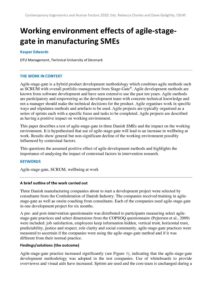| Document | Author Kasper Edwards |
| Abstract Agile-stage-gate is a hybrid product development methodology which combines agile methods such as SCRUM with overall portfolio management from Stage-Gate®. Agile development methods are known from software development and have seen extensive use the past ten years. Agile methods are participatory and empowering as the development team with concrete technical knowledge and not a manager should make the technical decisions for the product. Agile organises work in specific ways and stipulates methods and artefacts to be used. Agile projects are typically organised as a series of sprints each with a specific focus and tasks to be completed. Agile projects are described as having a positive impact on working environment. This paper describes a test of agile-stage-gate in three Danish SMEs and the impact on the working environment. It is hypothesised that use of agile-stage-gate will lead to an increase in wellbeing at work. Results show general but non-significant decline of the working environment possibly influenced by contextual factors. This questions the assumed positive effect of agile development methods and highlights the importance of analysing the impact of contextual factors in intervention research. |

